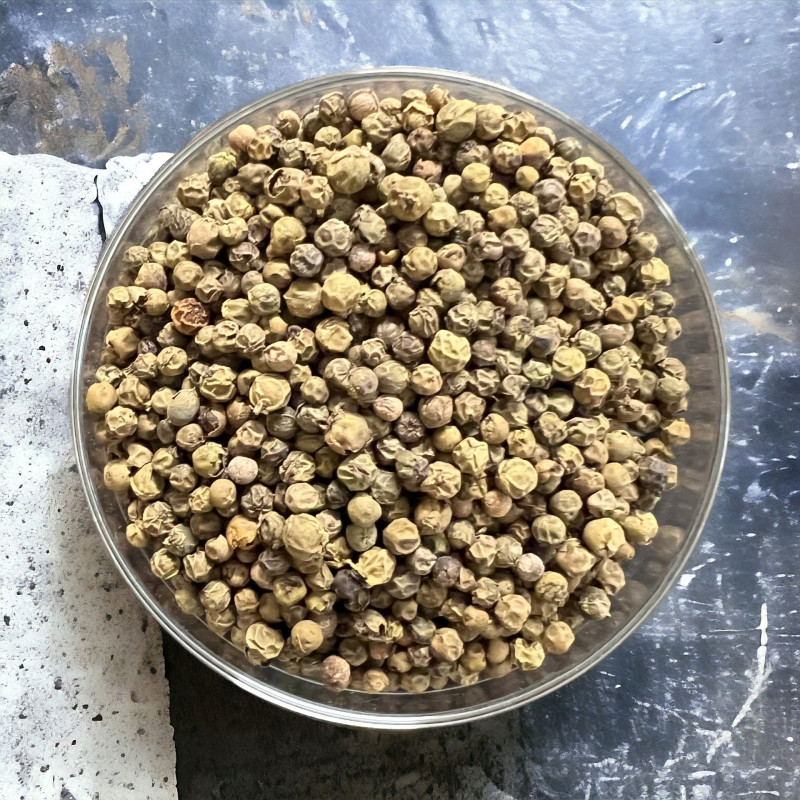
Reference: poivre5baiesE


It is strong, aromatic, and the only stage of pepper ripeness where the berries can be rehydrated.
It is traditionally used in delicious and spicy sauces that accompany fine meats, in pâtés, or even blended with other peppers.
 Delivery
Delivery
Mondial Relay
 Returns
Returns
See conditions
 Payments
Payments
100% secure
Produit livré en sachet refermable
°°°
Uses in Cooking:
Its flavor is far from mild, but that's also what we love about it...!
To use dehydrated green pepper, you have two options:
You can also use it in meat or fish terrines.
Who am I?
Origin: India
Scientific name: Piper nigrum
Green pepper consists of berries from the pepper plant harvested before maturity. They can be found fresh (very rarely in our regions), preserved in brine, or dehydrated as in this case.
The seeds of Piper nigrum go through different stages depending on their degree of maturity:
The pepper plant is native to the west coast of India, specifically the Malabar coast in the state of Kerala. Today, it has, of course, been planted in many other regions around the world, such as Southeast Asia (Indonesia and Malaysia), Madagascar, and Brazil. Recently, Vietnam has become the largest global producer of pepper. Each climate and terroir where pepper plants grow imparts different flavors, similar to wine!
The term "pepper" is applied to many spices, from Sichuan pepper to pink peppercorns, including certain chili peppers. However, only the seeds of Piper nigrum (the traditional black, white, and green peppers), Piper cubeba (cubeb pepper), and Piper longum (long pepper) are legally allowed to be called "pepper."
It is also worth noting that it is the amides of piperine that give pepper its spicy flavor!
A Little History:
Pepper was already known in ancient times, being used in Greece under Alexander the Great as well as in ancient Rome.
Pepper and a few other rare spices were long used as currency after the Arab conquest of Alexandria in 642 CE, due to their high price. This is where the expression "to pay in cash" comes from, derived from "to pay in spices"!
The exorbitant price of pepper in the Middle Ages and Italy's monopoly on its trade were largely responsible for the Portuguese search for a sea route to India. This route was discovered by Vasco da Gama in 1498, leading to a treaty between the two countries granting the Portuguese exclusive rights to half the world. A century later, they would lose this monopoly to the Dutch with their East India Company and then to the English.
Data sheet
Specific References
 Anne Marie P.
Anne Marie P.
Relève agréablement les viandes

 Anne Marie P.
Anne Marie P.
Relève agréablement les viandes

Reference: poivre5baiesE
Reference: 2N70996502
Reference: 6L5609802
Reference: 508207101
Reference: 2M6273801
Reference: Kubebe
Reference: SriLankaBlanc
Reference: 10N7699901
Reference: pimentjamaiqueE
Reference: poivresichuanV
Reference: poivresichuanE
Reference: poivreNEvietnam
Reference: 9N7644901
Reference: poivrevoatsE
Reference: poivreEbiosaotome
Reference: 2N70996502

It is strong, aromatic, and the only stage of pepper ripeness where the berries can be rehydrated.
It is traditionally used in delicious and spicy sauces that accompany fine meats, in pâtés, or even blended with other peppers.